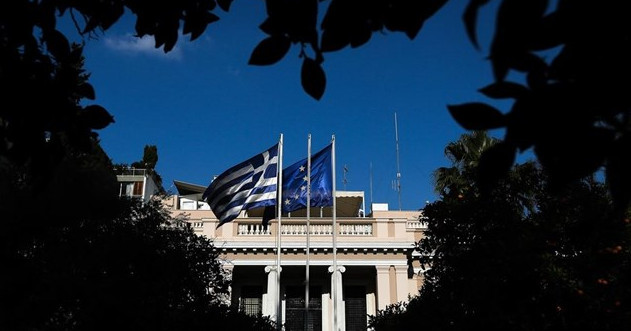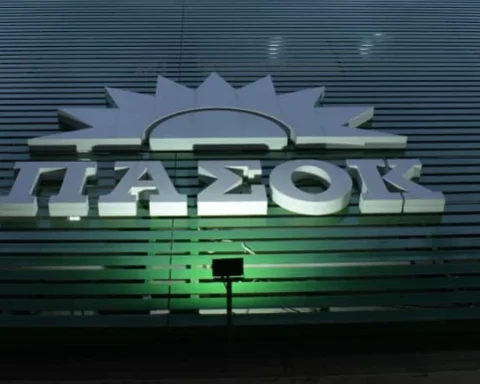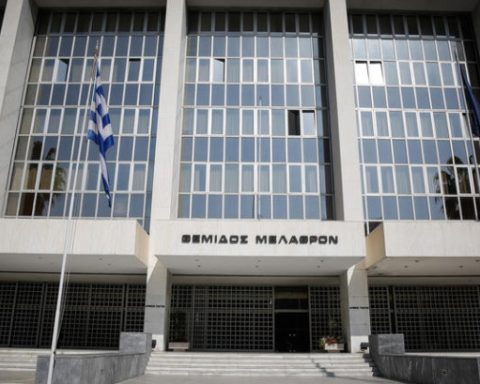 Λίστα στα αγγλικά που πρωτοδημοσιεύθηκε στο συνδρομητικό Macropolis με μέτρα συνολικού ύψους 3,7 δισ. ευρώ έδωσε στη δημοσιότητα το Μέγαρο Μαξίμου.
Λίστα στα αγγλικά που πρωτοδημοσιεύθηκε στο συνδρομητικό Macropolis με μέτρα συνολικού ύψους 3,7 δισ. ευρώ έδωσε στη δημοσιότητα το Μέγαρο Μαξίμου.
Η λίστα περιλαμβάνει προσδοκώμενα έσοδα 725 εκατ. ευρώ από τη φορολόγηση καταθέσεων στο εξωτερικό, 350 εκατ. από την καταπολέμηση της φοροδιαφυγής στον ΦΠΑ, 350 εκατ. από την αδειοδότηση των τηλεοπτικών καναλιών, 600 εκατομμύρια από τις ρυθμίσεις προς τις εφορίες και τα ασφαλιστικά ταμεία, άλλα 300 εκατ. ευρώ από τον Κώδικα Φορολογίας Εισοδήματος, 270 εκατ. από το νέο σύστημα συγκέντρωσης αποδείξεων και κληρώσεων με λαχνούς, 250 εκατ. από το λαθρεμπόριο σε τσιγάρα και καύσιμα, και 200 εκατ. από τους νέους διαγωνισμούς για τυχερά παιχνίδια.
Στη λίστα προβλέπεται ακόμα 1,5 δισεκ. ευρώ από αποκρατικοποιήσεις με έμφαση στον ΟΛΠ, το Ιπποδρομιακό Στοίχημα και τα περιφερειακά αεροδρόμια.
Η λίστα προβλέπει ακόμα κατάργηση πρόωρων συνταξιοδοτήσεων που υπονομεύουν τη σταθερότητα του ασφαλιστικού και την ενίσχυση της αυτονομίας της γγ. Εσόδων.
Παράλληλα, η κυβέρνηση προχωρά στην κατάργηση της ρήτρας μηδενικού ελλείμματος, ενώ προβλέπεται και η επαναφορά της 13ης σύνταξης και των κριτηρίων χορήγησης του ΕΚΑΣ
Στις προτάσεις περιλαμβάνεται ακόμα ο εξορθολογισμός των αμοιβών των δημόσιων υπάλληλων, αλλά απορρίπτονται οι περικοπές που προέβλεπε η κατάργηση της προσωπικής διαφοράς, κίνηση που θα περιέκοπτε το μισθό 70 χιλιάδων υπάλληλων.
Στο κείμενο γίνεται αναφορά στο θέμα του χρέους και τη σύνδεση της αποπληρωμής του με μια σειρά εργαλείων για την απομείωσή του, ενώ προβλέπεται και η δημιουργία τράπεζας ειδικού σκοπού για τη διαχείριση των κόκκινων δανείων.
Αναλυτικά η λίστα στα αγγλικά όπως δημοσιεύθηκε στο συνδρομητικό MacroPolis
«Greece and the Brussels Group began discussing over the weekend the details of the fiscal and structural measures proposed by Athens with the aim of securing the gradual disbursal of the remaining 7.2 billion euros in bailout funds.
There are conflicting reports about how the negotiations are progressing and whether the reforms list contains enough detail. The Greek government insists that talks are on the right path and its proposals have been thoroughly prepared.
Reports suggest that with Athens running out of liquidity an initial agreement between Greece and its lenders could see the European Central Bank lift the 15-billion-euro limit on T-Bill issues, allowing the government to avoid the possibility of a default before an bailout tranches are released.
Unnamed Brussels sources have told local and international media that the Eurogroup is unlikely to convene before mid-April but the Greek government remains hopeful that there can be a swift breakthrough in the technical talks.
MacroPolis understands that the list sent by Athens covers a number of key areas that have been under discussion between Greece and its lenders over the last few weeks.
Macro
We believe the new macro framework presented by the Finance Ministry sees GDP growth halved to 1.4 percent from the 2.9 percent growth seen in the budget submitted at the end of last year by the previous government. The political uncertainty is seen weighing heavily on consumption and investment during the first half of the year. A rebound is now expected in the second half of the year and a more pronounced expansion of 2.9 percent in 2016, mainly led by consumption and investment expenditure.
Unemployment is seen at 23.4 percent compared to the 22.6 percent in the budget, falling to 21.1 percent in 2016.
2015 is expected to be another deflationary year, with harmonised consumer price index at -0.5 percent (compared to 0.3 percent in 2015 budget) turning positive to 0.6 percent in 2016 (from 1.1 percent).
Fiscal
On the fiscal performance, MacroPolis understands that the Finance Ministry estimates the primary surplus could exceed 1.2 percent this year and even reach 1.5 percent assuming that a series of fiscal measures will be implemented with a net fiscal impact of 3.7 billion euros. Those estimates are also subject to the swift completion of negotiations between the Greek authorities and the institutions, ending the current uncertainty.
The bulk of the anticipated revenues are expected from audits on bank transfers abroad (725 million euros), fight against VAT fraud (350 million), public tenders for TV licences (350 million), settlement of tax and social security contribution arrears (600 million combined). Other interventions include streamlining the income tax code (300 million), a Portuguese-style VAT lottery scheme (270 million), tackling fuel and tobacco smuggling (250 million), tightening of the revenue collection mechanism (225 million) and new tenders for e-gaming (200 million).
The net fiscal impact of 3.7 billion euros also assumes that the government will postpone the zero-deficit clause for auxiliary pensions (cost of 326 million), reintroduce the 13th pension for pensioners below the poverty limit (cost of 600 million) and retain the current conditions for pensioners who receive the Social Solidarity Allowance (EKAS) (cost of 82 million) with a total negative fiscal impact of around 1 billion.
Privatisations
We believe the Finance Ministry has revised the revenues from privatisations to 1.5 billion euros for 2015, 700 million lower than the target of 2.2 billion set by the previous government. The key projects that are expected to be implemented or completed involve the Piraeus Port Authority (PPA), Mutual Horsebetting Licence (ODIE) and regional airports.
The market value of the 67 percent stake in PPA held by the Hellenic Republic Asset Development Fund (HRADF) that is on sale currently stands at 180 million.
With regards to the ODIE tender, Greek betting giant OPAP submitted the highest bid of 40.5 million euros last September. Greece’s privatisation fund HRADF stated on March 26 that it intends to invite OPAP to execute the agreement.
Regarding the tender process for a 40-year concession of use, operation and management of 14 regional airports, HRADF declared in late November the Fraport AG – Slentel Ltd consortium as the preferred bidder with an upfront fee of 1.23 billion euros and an annual payment of 22.9 million for the life of the concession.
Rather than seeking what it believes would be the fire sale of assets, the governments approach is to opt for agreements in which the state maintains a sizeable stake and can ensure labour rights are protected.
Structural Reforms
MacroPolis understands that the government wants to submit eight bills introducing structural reforms in the following areas:
1) Strengthening the autonomy of the General Secretariat of Public Revenues (GSPR) and freeing it of interference, which has been a longstanding demand from Greece ’s lenders.
2) Blocking early retirements that undermine the sustainability of the pension system.
3) Modernising the income tax code and eliminating exemptions.
4) Introducing a system of multi-lateral cancellations of arrears both from the state to taxpayers and vice versa.
5) Implementing an organic budget law that improves the management of public finances.
6) Allowing the out of court settlement of non-performing loans (NPLs).
7) Adopting a new code of civil procedure, encouraging greater specialisation of courts and launching an electronic submission system to speed up the dispensation of justice.
8) Improving the credibility and institutional independence of the Hellenic Statistical Authority (ELSTAT).
We believe that Athens has indicated it is willing to agree on a number of measures left over from the previous incomplete reviews of the Greek programme. These include measures relating to revenue administration, income tax reform, arrears clearance, organic budget law, insolvency reform, judicial reform, product market reforms (excluding regulation of the market for natural gas) and statistics.
There is, however, a range of areas that the government wants to change course. The coalition does not want to reduce pensions by applying the zero deficit clause. It does not plan to follow the previous government’s pledge to increase VAT rates in the tourism sector, at least until the end of June. Athens believes that further deregulation of labour markets would be damaging and advocates focussing on targeting unregistered work. The government agrees to streamline the public sector payroll but does not consent to a sudden cut in wages for 70,000 qualified personnel by removing the allowance they were given to soften the blow of large salary reductions.
Debt
Via the proposals sent to Brussels , the government is also looking to raise again the issue of debt sustainability and how this can be addressed by a return to growth that is driven by investment, cleaning up the NPLs in the banking system and linking Greek debt repayments to growth.
With an eye on what is going to happen after June 2015, when the current agreement with lenders expires, the Finance Ministry is proposing a new debt sustainability analysis (DSA) to be carried out, which would also hep establish the appropriate primary surpluses Greece has to achieve.
Athens is proposing the creation of an investment programme in cooperation with the European Investment Bank (EIB). It also wants to address NPLs through the creation of a bad bank by using the 10.9 billion EFSF bonds returned to the ESM last month. It suggests a restructuring of Greek debt through a menu of smart swaps that include nominal GDP-indexed bonds with the aim of creating confidence in the private sector that repayments are more manageable in the future, while investors will recogniseEurope has a direct stake in seeing Greece s nominal GDP grow.»

















